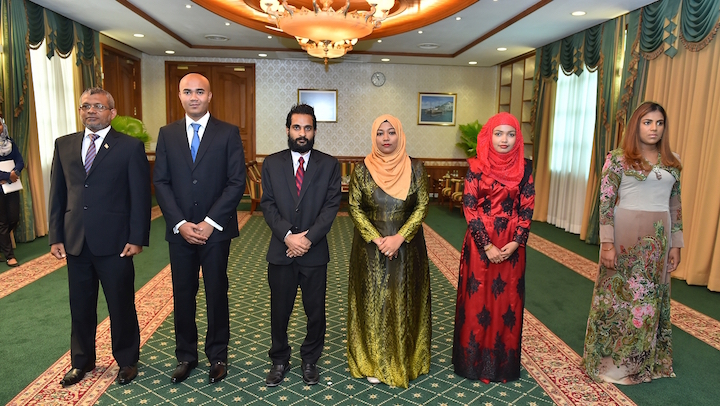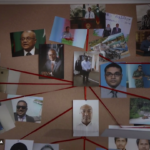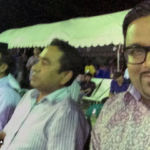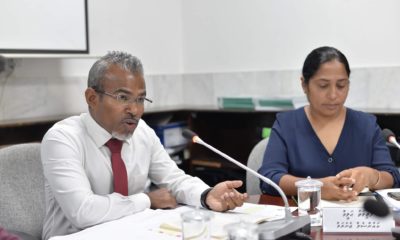Opposition MP Ahmed ‘ADK’ Nashid slammed the broadcasting regulator Thursday night over an MVR500,000 (US$32,425) fine imposed on the main cable television provider for rebroadcasting an Al Jazeera corruption exposé.
Speaking at a ceremony held by private broadcaster Sangu TV to launch a high-definition platform, Nashid said the Maldives Broadcasting Commission appeared to be more interested in issuing hefty fines than fulfilling its legal mandate of protecting and supporting television and radio stations.
The oversight body was authorised to impose fines by the widely condemned 2016 anti-defamation law, which criminalised speech or content deemed to be defamatory, anti-Islamic, in breach of social norms, or a threat to national security.
Medianet’s rebroadcast of the ‘Stealing Paradise’ documentary on Al Jazeera – which exposed systemic corruption, abuse of power and criminal activity at the highest level of government – was deemed to pose a threat to national security.
MP Nashid is a shareholder and an executive director of Medianet, the largest pay-TV broadcaster in the Maldives with more than 20,000 subscribers.
Mohamed Shaheeb, the MBC’s president, was in the audience during Nashid’s speech but did not acknowledge the criticism or the fine in his remarks at the ceremony.
According to a statement released by the MBC about the Medianet case, a complaint was filed on September 19 alleging that the explosive Al Jazeera documentary posed a threat to the country’s independence.
The documentary was based on hearsay with the express purpose of shaking the foundations of Maldivian sovereignty, the complainant contended, asking the regulator to take the strictest action against the “irresponsible broadcasters and rebroadcasters”.
Medianet had sought an opinion from the commission about rebroadcasting the documentary on the Al Jazeera channel, but the MBC said it was not a body that dictates to broadcasters. Television stations and cable service providers have the freedom to broadcast any content within the bounds of Maldivian law, it said.
But Medianet failed to fulfil its responsibility to check Stealing Paradise “for any content that contravened Maldivian law,” the MBC said. The documentary was released on YouTube on the morning of September 7 before its original broadcast later in the day.
The MBC also dismissed Medianet’s legal defence.
According to article 15 of the anti-defamation law, official privilege can be used as a defence against defamation complaints concerning the rebroadcast of “information in a report officially published by a foreign organisation or a foreign body or a foreign court or a foreign state.”
Medianet argued that Al Jazeera as “a media organisation registered in a foreign country” would fall under the exception. However, citing legal advice from the Attorney General’s office, the MBC said the provision does not apply to foreign media organisations.
The seven-member commission found that the documentary’s content contravened Article 9(a)(1) of the defamation law, which criminalises “expressing views that endanger the independence and sovereignty of Maldives.”
If the fine is not paid within 30 days, the MBC has the power to suspend or cancel Medianet’s broadcasting license.
The Stealing Paradise documentary had sparked a frenzy of anticipation in the Maldives with ministers and MPs rushing to President Abdulla Yameen’s defence and launching a campaign to discredit Al Jazeera.
Stealing Paradise was based on new evidence gathered from three mobile phones of former Vice President Ahmed Adeeb. It also featured secretly filmed confessions by three associates of Yameen’s jailed former deputy about delivering stolen cash to the president.
The government later dismissed the documentary as “defamatory and biased” and accused the Qatari broadcaster of advancing the opposition’s agenda.
The Maldives has since severed 33-year-old diplomatic relations with Qatar.
Earlier this month, Al Jazeera’s investigative unit won the prestigious Corruption Reporting Award for Stealing Paradise. The award was sponsored by Transparency International and handed out at the annual One World Media ceremony in the UK.
According to Al Jazeera, the government had hired a London-based legal and public relations firms “to try to suppress” the airing of the documentary.
Hours after Stealing Paradise was released online, the police raided the Maldives Independent office with a court warrant over an alleged coup plot. The documentary featured an interview with Zaheena Rasheed, the former editor of this publication, who was forced to go into exile.
Former Auditor General Niyaz Ibrahim, who appeared in the documentary and spoke about losing his job in 2014 after uncovering corruption, also fled the country.
Al Jazeera’s investigative reporter Will Jordan meanwhile faced numerous death threats on social media. The state broadcaster Public Service Media accused him of conspiring with the opposition to sabotage the Maldivian economy.
Jordan was the editor of the Maldives Independent (formerly Minivan News) in 2007.
Accepting the Corruption Reporting Award in London, Jordan dedicated the prize to Yameen Rasheed, a liberal blogger who was brutally murdered in Malé on April 23.
The fine slapped on Medianet last week was the fourth punitive action taken under the anti-defamation law.
In early March, the MBC slapped an MVR200,000 (US$13,000) fine on Raajje TV along with an MVR50,000 (US$3,240) fine on a journalist, which was followed a month later with an MVR1 million (US$64,850) fine imposed on the opposition-aligned station for airing a speech at a rally that was deemed defamatory towards Yameen.
The seven-member MBC has previously been accused of double standards after the appointment of Fathmath Zaina and Zeena Zahir in April 2016 by the ruling party-dominated parliament.
Both former journalists were working under First Lady Fathmath Ibrahim at the president’s re-election campaign office.
In December, the commission dismissed a complaint alleging defamation of former Presidents Maumoon Abdul Gayoom and Mohamed Nasheed by the state broadcaster.
The Maldives is now ranked 117 out of 180 countries in the Reporters Without Borders annual press freedom index, down from 112 the previous year.
Based on developments during the past year, RSF said the government continues to “persecute the independent media” and that many journalists have been the target of death threats from political parties, criminal gangs and religious extremists.


















